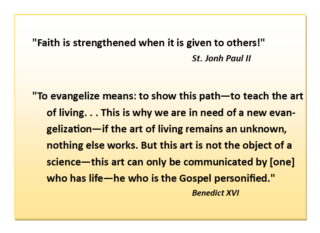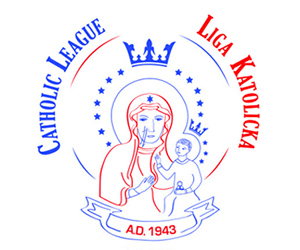
When I first read the books of Father Emilian Tardiff, Father Jose Prado Flores and other people associated with the “Evangelization 2000” movement, I was curious about what foundational ideas these powerful works of evangelization these priests share. I wondered why their preaching of the Good News is often confirmed by multiple healings, and above all by tremendous internal transformations in the hearts of many, and then I thought about what the cause was that in our parishes there is rarely any teaching as proposed by priests and everyone involved in the renewal movement of the Church.

I understood this only after I looked at what this “New Evangelization” was proposed to be. Many of us are still convinced that proclaiming the Gospel is basically telling colorful stories about Jesus. But the Gospel is not just a story. Jesus is the person in whom we “live, move in and are”. During one of his homilies, Bishop Carlos Talavar said the following: “To evangelize does not mean talking about Jesus without letting him act upon revealing His salvation to the world. To evangelize means to spread Jesus’ saving power. It’s not enough for the world to chat about Jesus. It needs to see Him in action, otherwise it will not believe in Him.”
Who should evangelize then? Obviously everyone who admits to being Christ, especially those who teach in His Name. In today’s church, however, there is large amount of people who should be called practitioners rather than believers. In spite of this, we need to ask ourselves – why is our teaching lacking in the power of faith of the apostles? Shouldn’t we change the strategies of our teaching?
How few of us understand that Christ has commanded us to recruit students (literally, “Go and make disciples from all nations) Mt. 28.19. Unfortunately, you can teach your whole life without seeing that the words preached do not change listeners into Christ’s disciples.
In the New Evangelization, a new strategy is needed, or rather, realizing the common goal and unity that he asked in the priestly prayer “Father, let them be one, let the world believe” (Jn 17:21)
Unity is therefore an imperative that must stand above many matters, and above all the prestige of persons. However, too many of us care for this prestige. For these people it is worth recalling that even Simon Peter was not able to catch a single fish himself, although he worked all night, but when he cast the net at the call of Christ, he could not even bear its weight. And he was the first fisherman! Too many people want to “fish on their own”, they care more about how to “lure more new ones” into a group, maybe a single parish or person, and do not notice that when fishing in the name of Christ another problem will arise – how to pull the net so that it does not break! It should be pulled together, just as Peter did – he invited companions from the other boat to help!
However, whoever wants to do it on his own is in danger of breaking the network. And that means empty parishes, deadness and stagnation.
At the beginning, however, we must remember that Evangelization, or “catching” Christ’s new disciples means understanding that the Gospel should reach the whole person, that is: soul, spirit and body. Two ways can be noticed. The path of paralysis – God first forgives his sin and then heals, and the path of the blind man from birth: heals him first, and then transforms him internally.
Most important, however, is to understand that although the Holy Spirit can use anyone, the first “Evangelizer” is Himself! He instills in us God’s life. Evangelization leads us to a personal encounter with Jesus. Such a meeting occurs when we understand that we are not learning doctrine in religion, but are learning to be with a LIVING PERSON !!! The basis of Christianity is Jesus Christ, and everything else is built later, even if it is morality, catechesis or theology. Unfortunately, in our teachings we often start from this second stage, and no one notices that it is like building on sand. The first should be to focus our efforts on proclaiming Jesus as Savior, Lord and Messiah – begin with the Foundation.
Roman Harmata







